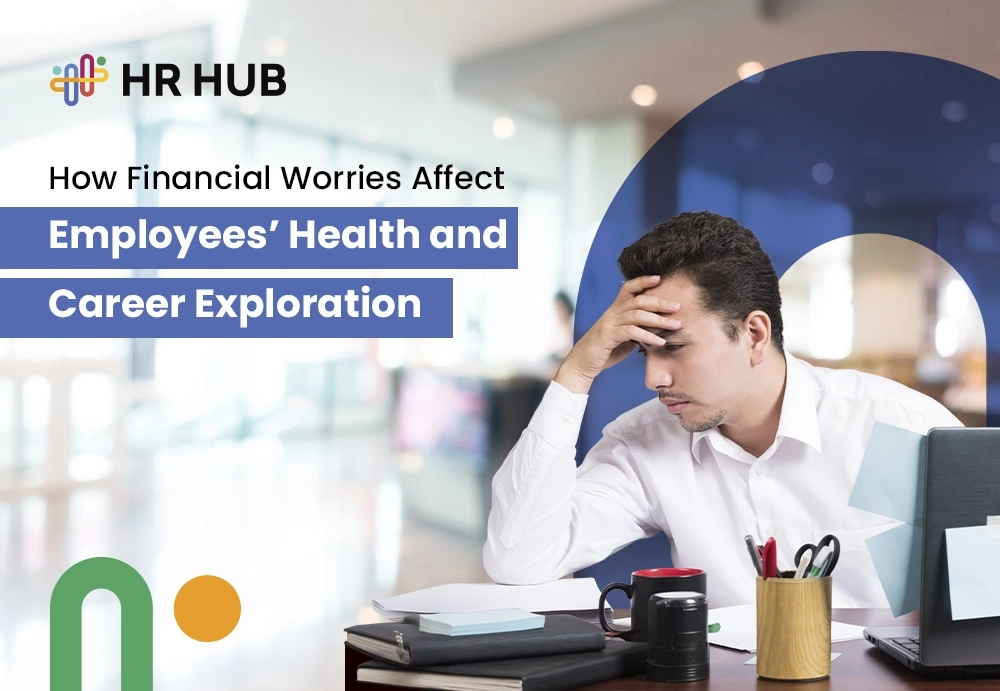Maternity and Paternity Leave in India: Policy, Importance, and Benefits
- Work Culture & Experience


Worrying about money is a huge stressor for many people and can cause various health problems. But it can also push employees to look for new job opportunities that are better-paying or more secure. Antje Schmitt, Teodora I. Heihal, and Hannes Zacher found that financial worries related to rumination and doubts about job decisions before action is taken. Should I consider other job options? Apply elsewhere? How to decide? In their research, it appeared that these decisional conflicts, or "action crises", negatively relate to health but also drive people to explore new career opportunities.
Financial worries, such as those arising from furloughs and companies’ poor economic outlooks, are a major source of stress and strain, affecting both lower and higher-income employees. These findings are confirmed by various scientific studies, reports, and recent polls. People concerned about their finances often report negative outcomes, such as lower quality of life, higher rates of depression, sleep problems, and even physical health issues, such as gastrointestinal symptoms and diabetes.
Interestingly, some research suggests that financial worries might also benefits. They can motivate individuals to seek better-paying or more secure jobs. This is particularly true during economic downturns when exploring new career options can help improve one's situation.
However, employees experiencing financial worries may do not immediately start acting and exploring job alternatives. Instead, they might experience what is known as an "action crisis", characterized by internal conflicts, doubts, and indecisiveness regarding job decisions. Should one stay or leave? Should one look for other opportunities to improve the financial situation? What are the pros and cons? This state involves a significant mental struggle. Studies have shown that such internal conflicts are linked to lower well-being, depression, and physical health issues. Much of the research on action crises has focused on students; their impact on employees' health and behavior is less clear. In our study, my co-authors and I applied the concept of action crises to financial worries, arguing that such worries trigger these internal decisional conflicts and their subsequent impact on health outcomes.
How do these decision conflicts relate to career exploration? The literature offers two perspectives. On the one hand, action crises can drain mental energy, making it difficult to act and explore new career options. Individuals might avoid making decisions, become inactive, or procrastinate regarding their careers. On the other hand, action crises can motivate individuals to gather more information about alternative career paths to make an informed decision about one’s job. When weighing the pros and cons of staying in or leaving a job, this indecisiveness might drive one to explore new opportunities. This perspective supports a positive relationship between action crises and career exploration.
To investigate these partly contrasting assumptions, we studied a group of employees from various industries, including hospitality, tourism, construction, and education, primarily in the United Kingdom. Their jobs were adversely impacted by the COVID-19 pandemic, such that they faced reductions in their work hours or were furloughed—conditions that increased the likelihood that financial worries became a significant personal concern.
We contacted the study participants three times over three months, asking about their financial worries, health complaints (such as fatigue, headaches, and back pain), career exploration (such as gathering information about other job opportunities), and action crises. For action crises, we inquired if they experienced internal conflicts, like constantly thinking about their jobs and doubting whether to stay or quit.
Our results showed that financial worries predict mental and physical health complaints. Financial worries also triggered action crises, which exacerbated these health issues. Interestingly, action crises also motivate individuals to explore new career opportunities. Thus, internal conflicts about job decisions can act as a double-edged sword: they harm health while also encouraging career exploration. Importantly, we found that the positive link between financial worries and career exploration through action crises was smaller than the negative impact on health. In other words, the adverse effects of indecision and doubt outweigh the benefits.
This study enhances our understanding of how individuals navigate financial worries, highlighting both the negative health effects and the positive push toward career exploration by considering action crises, a concept often overlooked in previous research.
From a company’s perspective, employees exploring career opportunities outside the organization with the possibility to leave can be undesirable, especially during times of staff shortages when they want to prevent turnover. Organizations should also be concerned about employees who, facing financial worries, start ruminating and doubting their career. Based on our findings, these internal conflicts can motivate employees to seek other opportunities but also harm their health.
Therefore, we encourage employers to take financial worries seriously and support their employees' well-being by offering financial counseling. Leaders should openly discuss financial well-being with employees, fostering a climate of open communication about financial concerns and career goals.
However, exploring new career opportunities can sometimes be a beneficial and adaptive strategy for employees facing financial worries. Since we found that job-related doubts trigger career exploration but also negatively relate to health indicators, we suggest that employees seek support to resolve these action crises quickly. This ensures that the internal decisional struggles do not persist and impact their well-being for extended periods.
Financial worries are a significant stressor that can impact both individuals’ health and career behaviors and decisions, such as exploring potentially better career opportunities. Employers should be sensitive to the financial difficulties and concerns of their employees, and support them to resolve their internal conflicts that may result from worrying quickly to maintain their well-being.
Schmitt, A., Heihal, T. I., & Zacher, H. (2024). Financial worries, health complaints, and career exploration: The role of action crises. Occupational Health Science, 8, 613–635. https://doi.org/10.1007/s41542-024-00182-2